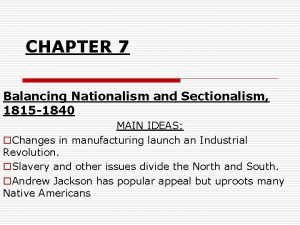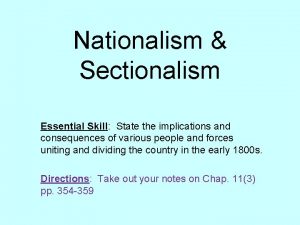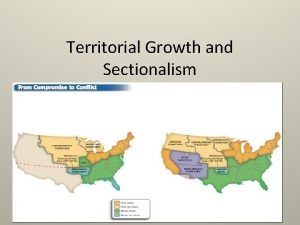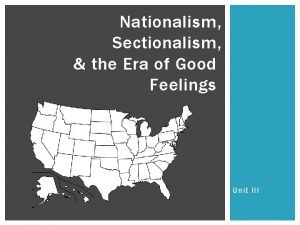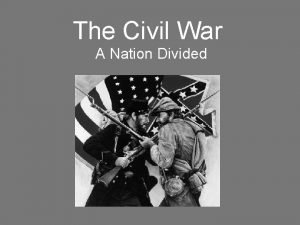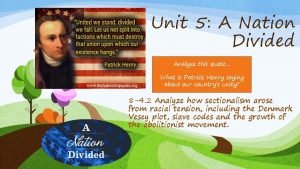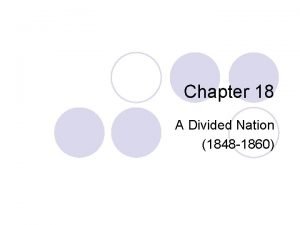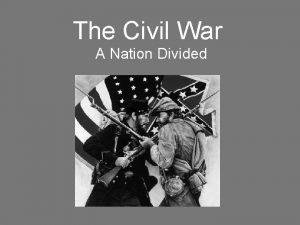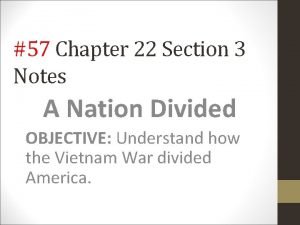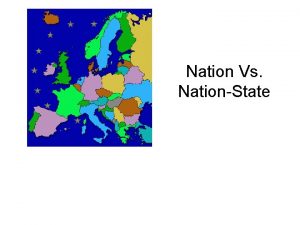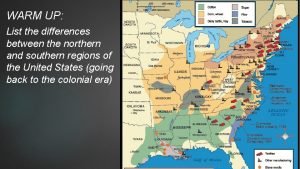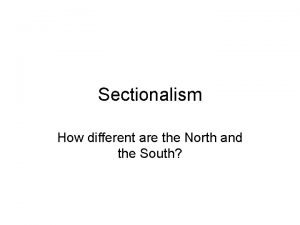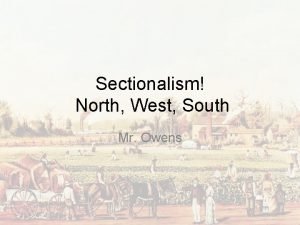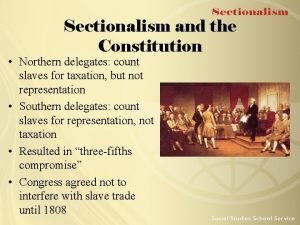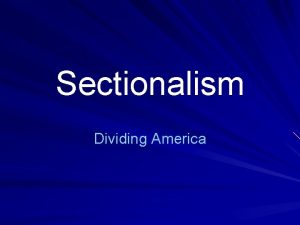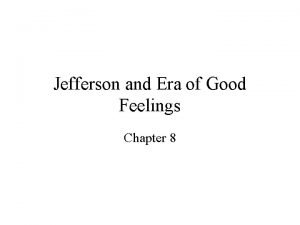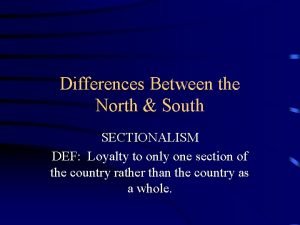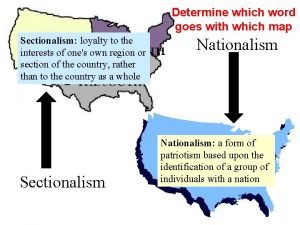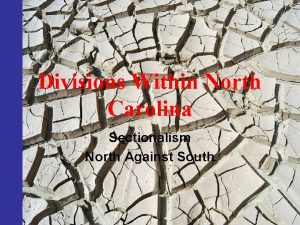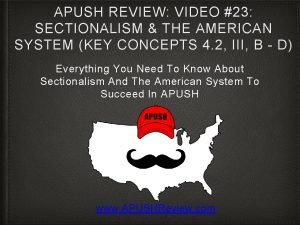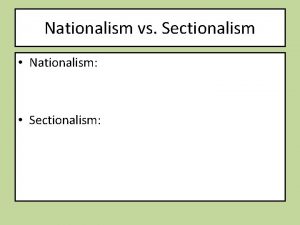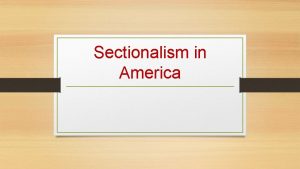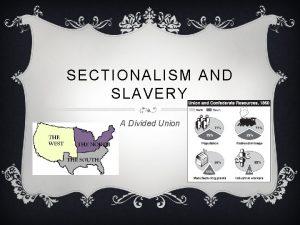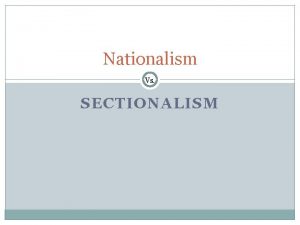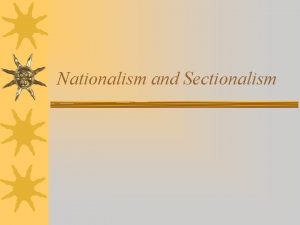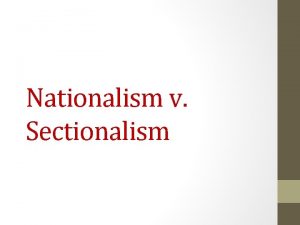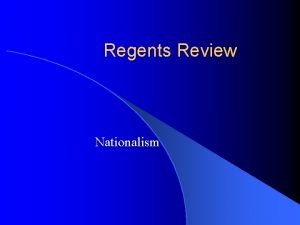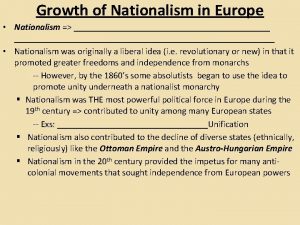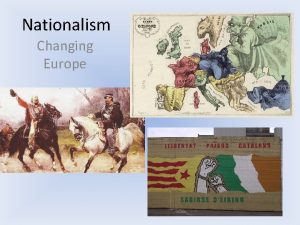Sectionalism to Nationalism 1800 A Divided Nation The




































![… ought they [opponents of slavery], to risk, in the remotest degree, the consequences … ought they [opponents of slavery], to risk, in the remotest degree, the consequences](https://slidetodoc.com/presentation_image_h2/1a1008ef618b873c17188a931b032075/image-37.jpg)














- Slides: 51

Sectionalism to Nationalism

1800 – A Divided Nation!!! The first contest between two organized parties – first time congressional caucuses chose candidates before selection of electors

• Federalists argued, a vote for Republicans was “for the tempestuous sea of anarchy and misrule” • Jefferson seen incorrectly as an atheist • Democratic Republicans argued, the vote was for “peace or war, happiness or misery”




Election Results • A tie between Burr and Jefferson (the two republican candidates) 12 th Amendment – Adams would have won if Burr had not enabled Jefferson to carry NY • The beginning of the Virginia Dynasty • Revolutionary! – Not in terms of policy but a peaceful change of leadership – never before seen – Importance of inaugural address – promotion of unity in a divided nation! • “ let us unite with one heart and one mind… we are all Republicans, we are all Federalists. ”

Jefferson’s republicanism only partly shaped the nation. • Continued many policies: tariff, national bank, debt payments, did not restaff government “few die, none resign” • BUT: “encouraged frugality, ” abolished internal taxes, allowed sedition act to expire, changed residency requirement back to five years, cut the size of the government, shrunk the army, built a mosquito fleet for coastal defense not protection of trade, decreased formality of office, growing stress on social equality

War on the Courts • Favored positive law, not the common law. Judges should reflect the mood of the people. – Worked to impeach federalist judges. – Repealed judiciary act of 1801 which had created new courts and ensured positions for losing Federalists. – Denied Marbury his commission. Marbury sued Madison to get his position

Marbury v. Madison • Marbury sued for a writ of mandamus • Marshall: Marbury owed the position , but could not have writ because the provision of JA of 1789 that gave the court this jurisdiction was unconstitutional • the right of judicial review established – a nondemocratic idea. – J had favored giving the states this right. – But since J won there was nothing for him to challenge

The West • great interest in the west • New land policy to promote “an empire of liberty” – cut amount of land required for purchase from 640 to 320 acres and allowed payment on time. – Prevent landlessness, and the development of urban “sores” with inequality

• • • Importance of New Orleans – threat of French control Mission: New Orleans or treaty with England Napoleon – need for cash, Haiti Rebellion $15 M What were the ideas of Federalists and Dem-Reps regarding constitutionality of the purchase? What was the significance of the purchase? – PROMOTION OF AGRARIANISM – SECURED CONTROL OF MISSISSIPPI

Haiti’s Rebellion • A black Haitian, a former slave-owner, led rebellion (1798 – 1803) • Slave-owners feared uprising would spread to US – Aid to rebels from US cut off by Jefferson (Adams, supported slaves – enemies of France)

And then there were the problems of neutrality… • • “entangling relations with none” – 1801 But: near constant conflict with England since 1775 and their allies the Native Americans – Jefferson’s attempts to promote assimilation failed in northwest. Tecumseh and The Prophet (Shawnee)s supported tradition. • In the southeast many including Cherokee assimilated – British seizures of ships and impressments of seamen (6000) – 1807 Chesapeake Incident • “the country has never been in such a state of excitement since the battle of Lexington. ” (Jefferson)

Tecumseh and the Prophet • Very familiar Native American arguments – – land issues – rejection of assimilation – Need of confederation • • “Sell a country! Why not sell the air, the great sea, as well as the earth? Did not the Great Spirit make them all for the use of his children? ” “Where are the Pequot, Narragansett, the Mohican, the , and other powerful tribes of our people? They have vanished before the avarice and oppression of the white man, as snow before the summer sun. ”

Battle of Tippecanoe - 1811 • General W. H. Harrison • “ no doubt of the influence of British agents” • Tecumseh later led all out war against Americans

Jefferson and Madison tried to avoid war!!! • 1806 – non importation failed • 1807 – Embargo Act – An unpopular disaster causing economic depression • MA and CT refused to obey law – England had full warehouses • Madison: Non- Intercourse (1809) • Macon’s Bill Number 2 (1810) • No resolution

The War Debate • Not a presidential war! Popular pressure. • War Hawks. NATIONALISTS !Young representatives from south and west – expansionists, anti-British, nationalists, pressed Madison for war – Henry Clay and John Calhoun – Saw impressment differently from Federalists – Problems with Native Americans. Desire for Canada and Florida to weaken Native Americans – “On to Canada”

But was it the shipping rights of neutrals that led to the Declaration of War in 1812?

The Results of the War • For the most part the war did not go well. – Little enthusiasm for the war – few volunteer troops. Lack of support in NE – A nation unprepared – no bank, limited tax revenues, fleet building halted – The capital was burned and only a stirring defense of Baltimore saved the city – Jackson did defeat Creek and Cherokee at Horseshoe Bend – Treaty of Ghent (1815) – “status quo ante- bellum” no land transfers, no mention of impressments • Britain still fearful of France on the continent wanted to conserve rsources

• Hartford Convention (January, 1915) – sectionalism! – Meeting of federalists to propose constitutional amendments • 2/3 vote in Congress necessary for war, admission of new states, embargoes • No two successive presidents from the same state

Understand!!!! – nationalism and democracy reinforced. • Battle of New Orleans (post Ghent) Jackson, with militia, pirates, volunteers, defeated English (2000 casualties to 20) – American exceptionalism – democracracy overcame Old Europe! – Jackson – a NEW HERO!



Warm up: copy this slide • • Cultural Nationalism Literature: – James Fenimore Cooper – Last of the Mohicans – Americ an themes and Heroes Art – Hudson River School – Durant – Church

A new sense of nationalism (feeling of national identity and unity) replaced sectionalism and party loyalties • Federalist party, discredited, disappeared Era of Good Feelings – Intra party strife (quids =radical republicans)


• Federalist ideas reborn in Republican Party (republicans become nationalists!) – Madison in 1815 called for expansion of navy and army, a protective tariff, a new national bank and internal improvements – Clay called his plan for national bank, tariffs and internal improvements the American System – government support for economic growth • Elements of plan support each other • Reflected and promoted market economy • Promote national unity – Role for each region:

• American Plan mostly passed – Tariff supported in all regions – A new national bank passed in 1816 , again chartered for 20 years – The national road was extended but Madison vetoed roadbuilding in states. States became builders of roads and canals – JQ Adams (P in 1824) even called for a national university

Foreign Policy of Monroe (strong assist by JQ Adams) – proactive, nationalistic • Treaty of 1818: shared control of Oregon for 10 years, northern border of LA Purchase • Seizure of Florida. Adams Onis or Florida Acquisition Treaty (1819) – Jackson sent to FL to retake slaves and push back Seminoles. Jackson seized Spanish forts and threatened to hang governor. – Adams; FL derelict therefore it may be seized. Spain agreed – in return US gave up claims to Mexico

• Monroe Doctrine (1823) – not a law! – US did not pass joint resolution with Britain, but knew Britain would support US • No new colonies or interventions in the Americas – The US would protect its interests • US would not intervene in Europe

Chief Justice Marshall Nationalism in the Courts • Mc. Culloch v. Maryland (1819) – Supported idea of loose interpretation – Struck down state law. – The threat of a powerful central government • “the States have no power, by taxation or otherwise, to retard, impede, burden, or in any manner control, the operations of the constitutional laws enacted by Congress”

• Cohens v. VA (1821) – The right of the SC to review decisions of state courts • Gibbons v. Ogden (1824) – Only federal government can regulate interstate trade


• First territory in LA: • Significance of Balance: • Precedents: • Petition for Statehood: • Tallmadge (1819): • The Responses: • The Compromise: The issues

John Q. Adams…“I take it for granted that the present question is a mere preamble – a title page to a great tragic volume. ” T Jefferson … “All I fear, do not see the speck on the horizon which is to burst on us as a tornado… the dispute was like a firebell in the night… It filled me with terror”
![ought they opponents of slavery to risk in the remotest degree the consequences … ought they [opponents of slavery], to risk, in the remotest degree, the consequences](https://slidetodoc.com/presentation_image_h2/1a1008ef618b873c17188a931b032075/image-37.jpg)
… ought they [opponents of slavery], to risk, in the remotest degree, the consequences which this measure may produce? These may be the division of this Union and a civil war. Knowing that whatever is said here must get into the public prints, I am unwilling, for obvious reasons, to go into the description of the horrors which such a war must produce, and ardently pray that none of us may ever live to witness such an event. - Pinckney

Jefferson, April 22, 1820 … The cession of that kind of property, for so it is misnamed, is a bagatelle which would not cost me a second thought, if, in that way, a general emancipation and expatriation could be effected; and gradually, and with due sacrifices, I think it might be. But as it is, we have the wolf by the ears, and we can neither hold him, nor safely let him go. Justice is in one scale, and self-preservation in the other. Of one thing I am certain, that as the passage of slaves from one state to another would not make a slave of a single human being who would not be so without it, so their diffusion over a greater surface would make them individually happier, and proportionally facilitate the accomplishment of their emancipation, by dividing the burden on a greater number of coadjutors. An abstinence too, from this act of power, would remove the jealousy excited by the undertaking of congress to regulate the condition of the different descriptions of men composing a state. This certainly is the exclusive right of every state, which nothing in the Constitution has taken from them and given to the general government. Could Congress, for example, say that the nonfreemen of Connecticut shall be freemen, or that they shall not emigrate into any other state.

Tallmadge, 1819… “If a dissolution of the Union must take place, let it be so! If civil war, which, gentlemen, is so much threatened, must come, I can only say, let it come… If blood is necessary to extinguish any fire which I have assisted to kindle, I can assure gentlemen, while I regret the necessity; I shall not forbear to contribute my might. Sir, the violence to which gentlemen have resorted on this subject will not move my purpose, nor drive me from my place. … Sir, on this subject the eyes of Europe are turned upon you. You boast of the freedom of your constitution and your laws… the enemies of your government and the legitimates of Europe, point to your inconsistencies.

Arthur Livermore, 1820…An opportunity is now presented, if not to diminish at least to prevent, the growth of a sin which sits heavy on the souls of every one of us. By embracing this opportunity, we may retrieve the national character, and, in some degree our own. But if we suffer it to pass unimproved, let us at least be consistent, and declare that our Constitution was made to impose slavery, and not to establish liberty. Let us no longer tell idle tales about the gradual abolition of slavery; away with colonization societies, if their design is only to rid us of free blacks and turbulent slaves; have done also with bible societies, whose views are extended to Africa and East Indies, while they overlook the deplorable condition of their sable brethren within our own borders; make no more laws to prohibit the importation of slaves, for the world must see that the object of such laws is alone to prevent the glutting of a prodigious market for the flesh and blood of man, which we are about to establish in the west, and to enhance


Jacksonian America Jackson as the symbol of the age as well as the engine •

Changes in the franchise precede Jackson! – decreased use of poll taxes and property requirements – not universally popular!

• Political Parties – “New” Democrat”: western farmers and eastern “ mechanics” or workingmen. The poor as opposed to the elites – A second party system: democrats v. whigs! • Campaigning pitched to the common man – hard cider, beer and barbecue! • campaign issues : sensation and log cabins. – Adams characterized as a pimp, condemned for bringing gaming tables into the white house. – Jackson’s wife! – Log cabins of Harrison ( Webster apologized for not being born in a log cabin)

• Jackson and Corrupt Bargain (1824) – Clay v. Jackson v. Crawford v. Adams – Jackson won popular and electoral vote – HR elected Adams • CORRUPT BARGAIN; CLAY TRADED SUPPORT FOR SECRETARY OF STATE



Also…. • new breed of political leaders – Important to be common! Log cabins! (Harrison must pretend) – Crockett – campaigned on number of bears killed – Jackson – questionable parentage, impoverished background, hard charging, hard drinking, no formal schooling. an American success story, “Jesus, just another Jackson. ” The contradiction: land speculator and owner of the Hermitage and 100 slaves. Adams spoke of him as a barbarian. Jefferson of his dangerous rage. – Contrast with Q. Adams!

• Increasing voter turnout – percentage of qualified voters voting

• What is the common theme?

• The Growing Trend Towards Democracy the result of several factors • Celebration of common man following 1812 • meaninglessness of property requirements • market economy increased stake of Americans. – Issues: Missouri, Panic of 1819, tariffs • Second Great Awakening • The Corrupt Bargain of 1824. Jackson won the popular and electoral vote but seemed to be cheated by Adams and Clay!
 Chapter 7 balancing nationalism and sectionalism
Chapter 7 balancing nationalism and sectionalism Quiz 3: nationalism and sectionalism
Quiz 3: nationalism and sectionalism Patriotism vs nationalism venn diagram
Patriotism vs nationalism venn diagram Nationalism vs sectionalism
Nationalism vs sectionalism Era of good feelings nationalism and sectionalism
Era of good feelings nationalism and sectionalism What's the difference between nationalism and sectionalism
What's the difference between nationalism and sectionalism Nationalism 1800-talet
Nationalism 1800-talet A nation divided: north vs. south
A nation divided: north vs. south Analyze this quote
Analyze this quote A divided nation section 3
A divided nation section 3 What does this picture depict
What does this picture depict Chapter 22 section 3 a nation divided
Chapter 22 section 3 a nation divided Nation state vs nation
Nation state vs nation State vs nation
State vs nation Nation vs nation state
Nation vs nation state Sectionalism
Sectionalism 36 30 line
36 30 line Sectionalism def
Sectionalism def Sectionalism def
Sectionalism def West sectionalism
West sectionalism Sectionalism def
Sectionalism def Sectionalism
Sectionalism Sectionalism def
Sectionalism def Sectionalism map
Sectionalism map Sectionalism def
Sectionalism def Clay's american system apush
Clay's american system apush Alleluia hat len nguoi oi
Alleluia hat len nguoi oi Tỉ lệ cơ thể trẻ em
Tỉ lệ cơ thể trẻ em Sự nuôi và dạy con của hươu
Sự nuôi và dạy con của hươu đại từ thay thế
đại từ thay thế Vẽ hình chiếu vuông góc của vật thể sau
Vẽ hình chiếu vuông góc của vật thể sau Quá trình desamine hóa có thể tạo ra
Quá trình desamine hóa có thể tạo ra Cong thức tính động năng
Cong thức tính động năng Thế nào là mạng điện lắp đặt kiểu nổi
Thế nào là mạng điện lắp đặt kiểu nổi Hình ảnh bộ gõ cơ thể búng tay
Hình ảnh bộ gõ cơ thể búng tay Lời thề hippocrates
Lời thề hippocrates Dot
Dot Vẽ hình chiếu đứng bằng cạnh của vật thể
Vẽ hình chiếu đứng bằng cạnh của vật thể độ dài liên kết
độ dài liên kết Môn thể thao bắt đầu bằng chữ đua
Môn thể thao bắt đầu bằng chữ đua Sự nuôi và dạy con của hổ
Sự nuôi và dạy con của hổ điện thế nghỉ
điện thế nghỉ Biện pháp chống mỏi cơ
Biện pháp chống mỏi cơ Một số thể thơ truyền thống
Một số thể thơ truyền thống Trời xanh đây là của chúng ta thể thơ
Trời xanh đây là của chúng ta thể thơ Gấu đi như thế nào
Gấu đi như thế nào Frameset trong html5
Frameset trong html5 Thiếu nhi thế giới liên hoan
Thiếu nhi thế giới liên hoan Số nguyên tố là gì
Số nguyên tố là gì Tia chieu sa te
Tia chieu sa te Các châu lục và đại dương trên thế giới
Các châu lục và đại dương trên thế giới Thế nào là hệ số cao nhất
Thế nào là hệ số cao nhất
